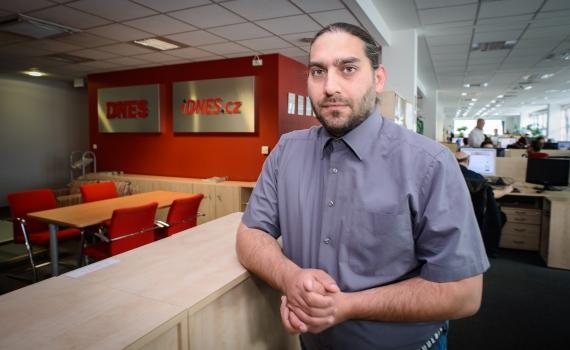Patrik Banga: I'm for collecting ethnic data in all areas, but the majority can't tell who is Romani

Ivan Langr (Greens), Vice-Mayor of Liberec in charge of social affairs, has rebelled against the methodology recommended for estimating the number of Romani people in the regions that he has received from the Office of the Government of the Czech Republic. As has already happened here more than once, Langr has sparked a tempestuous discussion about whether estimating the numbers of Romani people should even happen and if so, what the appropriate method is to use.
In principle, we must remember that in general, we do have a form here for the census that each citizen completed most recently in 2011. Lo and behold, according to that last census, there are approximately just 13 000 Romani people in the Czech Republic.
One might well ask whether somebody got the data wrong and only recorded it for a single region instead of for the entire country. Logically, therefore, the question arises of whom, basically, we are even supporting if the Romani population is so small here?
That this data is notably skewed is clear to just about all of us, I believe. It is also generally clear to the Romani part of the population why this is the case.
It’s not as fun to publicly declare oneself Romani as it might appear. To be Romani – or for the majority society here, to be a “Gypsy” (or a “black mug”, a “brown Czech”, a “chicory”, a “Kofola”, a “nigger”), and to publicly be one, equals creating a problem for oneself.
Sometimes it means creating hundreds of problems. After my brother left the “Czech Nightingale” music awards ceremony in protest, he and I received hundreds of hateful posts on social media.
Not everybody has the balls for that. To be absolutely sincere, I am not surprised.
I still say that I would like to see the ethnicity of each and every convicted perpetrator of a crime be published here so we could finally refute the myth that it is Romani people in particular who are to blame for the vast majority of crime. This brings us to the crux of the matter.
We are Romani people playing at being gadje because the public wants us to be gadje. They want us to be assimilated, “decent” (and woe to those of us who speak Romanes in public!).
That’s why the census doesn’t show 400 000 of us, which is my personal estimate, but 13 000. Should we have a representative in public office because we are the biggest ethnic minority in the Czech Republic?
Why? Officially there are only 13 000 of us here.
There are more Ukrainians here, officially, and more Vietnamese. Are we supposed to have the right to desegregated education?
Who is there to segregate? How many of those 13 000 people are children attending school?
I could go on in that vein forever. The bottom line is, we all need to know how many Roma are even here.
We Roma need to know that we are a big, integral part of this republic. This is our home, whether anybody else likes it or not.
In the final analysis, such knowledge would, in fact, show us all what it is that we are facing together. Once it can finally be said how many of us there even are here, then maybe we will achieve public office, and finally somebody will meaningfully represent us.
That is why I agree with ethnic data collection. Problem Number Two then arises: How can you tell whether somebody is Romani?
I admit that I don’t know the answer to that question. The methodology is difficult.
It cannot work in such a way that the majority will decide who is a member of our minority. In the Czech Republic, the environment is not one where Romani people are able, without fear, to publicly espouse their identity.
Rather, it is, in my opinion, necessary to work with Romani people so they will want to publicly espouse their origins, of their own accord. That is the way to acquire actual, real data.
I would begin a campaign for Romani people to stop hiding, to stop being forced to play gadje, and then I would convince them, during the next census, to put their origins on the record. As long as being Romani here involves a stigma (and moreover, the same stigma held by the Nazis) then nobody here will ever acquire the actual data.